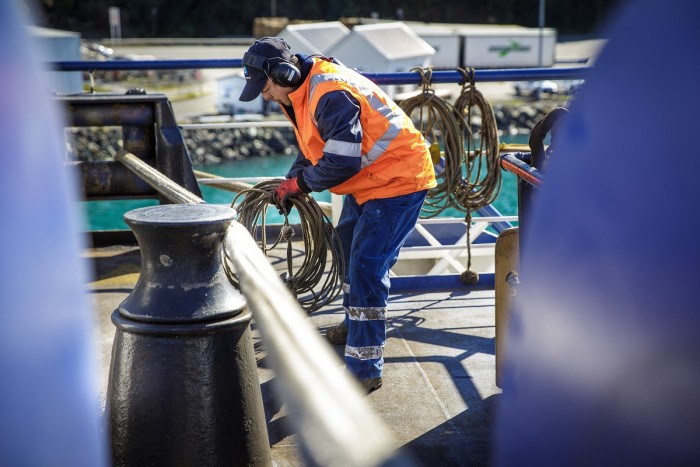Deckhand
Ringa Paparahi
Alternative titles for this job
Deckhands may take care of passengers and assist in the operation of vessels such as harbour ferries and charter boats, or cast and haul in nets, lines or pots, and process fish on inshore or deep-sea fishing vessels.
Pay
Deckhands on inshore fishing vessels usually earn
$49K-$55K per year
Deckhands on deep-sea fishing vessels usually earn
$49K-$90K per year
Source: Maritime New Zealand, 2020.
Job opportunities
Pay
Pay for deckhands varies depending on what type of vessel they work on and their experience.
Pay for fishing deckhands
Fishing deckhands are paid a wage and/or a percentage of the worth of each trip's catch.
- Inshore fishing deckhands can expect to earn between minimum wage and $55,000 a year.
- Deep-sea fishing deckhands usually earn between minimum wage and $85,000.
- Highly qualified and experienced deep-sea fishing deckhands can earn $90,000 or more.
Pay for ferry and charter boat deckhands
Deckhands on vessels such as ferries and charter boats usually earn minimum wage or a little more a year. They may earn more than this with overtime and allowances.
Source: Maritime New Zealand, 2020.
- PAYE.net.nz website – use this calculator to convert pay and salary information
- Employment New Zealand website - information about minimum wage rates
(This information is a guide only. Find out more about the sources of our pay information)
What you will do
Deckhands may do some or all of the following:
- assist with berthing, casting off and anchoring vessels
- assist with operating, maintaining and cleaning vessels and equipment such as nets and ropes
- cast and haul in fishing nets, lines and pots
- process and pack fish
- help passengers on and off vessels, and look after cargo or passengers' baggage
- prepare and serve food and drink
- provide information and commentary for passengers
- carry out emergency drills and procedures.
Skills and knowledge
Depending on the type of boat they work on, deckhands need to have knowledge of some or all of:
- rope handling and the use of knots and lashings on a vessel
- mending nets and splicing wire and rope skills
- how to maintain equipment and machinery
- the journey, destination and tourist attractions to provide information to passengers
- how to cast and haul in nets, and fish processing skills such as gutting and filleting
- safety at sea, first aid and emergency procedures, including firefighting, abandoning ship and emergency navigation.
Working conditions
Deckhands:
- usually work shifts, including early mornings and late evenings, weekends and public holidays. Fishing deckhands on inshore boats may spend up to a week at a time at sea. Those on deep-sea fishing boats can spend 40 to 50 days at sea, working six hours on, six hours off
- work on deck or below deck on fishing boats, ferries or charter boats. Deep-sea fishing deckhands also work in the on-board factory processing fish
- work in all types of weather conditions, including hazardous, very rough seas
- may travel to different ports around New Zealand. Those working on deep-sea fishing boats may fish in the South Pacific or Southern Ocean.
What's the job really like?

Bailey Puata
Deckhand
Launch your seafaring career
For Bailey Puata working as a fishing deckhand inspired his ambition for a career at sea.
"I left college midway through Year 12 to give it a crack on Sealord’s fishing boats. Hopefully I will get to bosun or second mate in the next few years, and in the end have my own boat and be a skipper.”
Bailey is taking every opportunity to gain qualifications to help him on his journey. "Last trip off, I got my deckhand ticket. I’ve also got a forklift licence and am getting my crane licence soon.”
Work hard and be a team player
Bailey says it can be hard work on the boats. “I shoot the gear (nets) over the back and six hours later we haul it all up on board. It gets tipped down into the factory and we help out with the packing and filleting and driving the machine."
Having the right attitude is key for a deckhand. “You've got to have a good work ethic and be able to work together within a team."
Excitement at sea and well-earned rest
Fishing offshore in all weathers tests any fishing deckhand but Bailey likes it when it’s rough. “It makes you a lot more aware and adds a bit of excitement. And the six-weeks on, six-weeks off roster gives me plenty of time to chill out!”
Entry requirements
There are no specific entry requirements to become a deckhand as you gain skills on the job. Most employers require you to pass maritime medical, eyesight and drug tests.
Hours at sea may count towards gaining a Qualified Deck Crew (QDC) Certificate.
Further qualifications include the Advanced Deckhand-Fishing (ADH-F) Certificate.
Secondary education
There are no specific secondary education requirements to become a deckhand. However, English and maths to at least NCEA level 1 are useful.
Personal requirements
Deckhands need to be:
- able to work well as part of a team
- disciplined, with good attention to detail
- alert, and able to remain calm under pressure and in an emergency.
Useful experience
Depending on the industry you want to work in, useful experience for deckhands includes:
- manual labour
- experience as a hospitality crew member at sea
- customer service work, especially in tourism or related areas
- experience at sea, such as pleasure boating or volunteering for the coastguard.
Physical requirements
Deckhands need to have good hand-eye co-ordination, a good level of fitness and must be strong.
Find out more about training
What are the chances of getting a job?
Job chances best on deep-sea fishing boats
Opportunities for finding work as a fishing deckhand are good, especially on deep-sea fishing boats. The hard work and long periods spent away from home means employers often find it hard to find and keep crew.
People with an advanced fishing deckhand qualification have the best chance of finding work.
Deckhands with a Qualified Deck Crew or higher qualification appears on Immigration New Zealand's transport sector agreement. This means the Government is actively encouraging skilled deckhands from overseas to work in New Zealand
According to the Census, 2,133 deckhands worked in New Zealand in 2018.
Work experience can improve your chance of employment
You can improve your chances of employment by:
- directly approaching a fishing company or skipper, as many jobs are not advertised
- working as an at-sea or onshore seafood processor
- doing a pre-employment course
- looking for maritime hospitality crew work in spring before the busy summer season.
Types of employers varied
Deckhands may work for:
- small passenger ferry companies
- container and cargo shipping companies
- inshore and deep-sea fishing companies.
Sources
- Stats NZ, '2018 Census Data', 2019.
- Immigration New Zealand, Transport Sector Agreement Finalised and Green List Changes Confirmed, 26 April 2023, (www.immigration.govt.nz).
- Taylor-Smith, G, senior technical advisor, Maritime New Zealand, careers.govt.nz interview, October 2020.
(This information is a guide only. Find out more about the sources of our job opportunities information)
Progression and specialisations
Deckhands who gain relevant qualifications can progress into positions of more responsibility, such as leading hand or bosun, first mate and eventually skipper or ship's master. They may also progress to working on larger, more complex vessels.
Deckhands may specialise in a number of roles including:
- Able Seafarer Deckhand
- An able seafarer deckhand is a further advanced deck watch rating, and performs more advanced navigational watch tasks.
- Bosun
- A bosun is in charge of all deck crew on board a vessel and reports directly to the master.
- Commercial Inshore Vessel Deckhand
- Commercial inshore vessel deckhands assist inshore launch masters in the operation of vessels such as harbour ferries and charter boats.
- Deck Watch Rating
- As well as regular deckhand duties, the watch rating is part of the navigational watch.
- Fishing Deckhand
- Fishing deckhands shoot (cast) and haul in the nets, lines or pots on inshore and deep-sea fishing vessels. They may also process fish.
- Maritime Tourism Deck Crew
- Tourism Deck Crew host tourists and assure the safety and entertainment of those on board.
- Superyacht Crew
- A superyacht is a yacht that is 24 metres or longer, the crew follow orders of the captain and can do any job on board, from cleaning and hospitality roles to looking after passengers, as well as assisting in casting off and anchoring the vessel.
Last updated 31 March 2025

